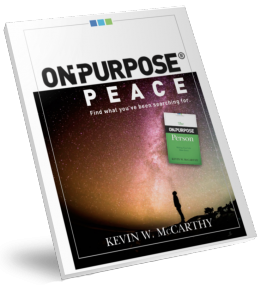This On-Purpose® Minute may rattle your cage a bit as I challenge what might be a hidden and unproductive point of view coloring your daily experience. More importantly, it may be setting the trajectory of your life far lower than it was designed to be.
Trials and errors in life are inevitable, but “trial and error” does not need to define our approach to life.
As clarity around who you are comes to light, you’ll discover a greater sense of peace despite the circumstances. Yes, the trials and errors will still come, but they won’t toss you about as they have in the past. Be clear about who you are and whose you are.

How does “Trial & Error Living” affect us?
Here’s a true account of a small business advisory client from years ago. My client came to me down and discouraged because his business was losing money and he wanted to sell it soon before the bottom fell out.
In reviewing the business, I realized that if he were to sell it there were a few things he could do to “window dress” or clean it up for sale that would make it far more appealing to a buyer. In anticipation of the sale, we began to make some of these small changes and tweaks to his systems.
Two months later, my client called to say he no longer wanted to sell the business because it was making money again; he was thrilled and wanted to keep it. Oddly enough, about a year later, he called me wanting to sell the business again because it was losing money again, albeit after a substantial growth in sales.
We went through the same cycle—cleaning up a few things for the sale and the revenues turning around. It happened yet a third time in 18 months. The third time, however, the pattern of his emotional swings rather than the business matters caught my attention.
His business was basically sound, but there was something “wrong” with the business owner.
Why was he on such an emotional roller coaster? The pattern was apparent—when the business showed bottom-line profits, he was happy. When the business showed bottom-line losses, he was sad.
It struck me that his emotional well-being was tied to a monthly financial statement. The P&L report literally colored his world in 30-day increments.
Good news—good life.
Bad news—bad life.
That’s interesting, but here’s where it got fascinating. I asked him if he knew how to read a financial statement. Of course not. He knew sales was the top number and profit and loss was the bottom number but everything in between was meaningless to him.
In effect, his emotional stability was tied to what was seemingly a random event—profit or loss.
He was a hard worker, but some months he made money and other months he lost money—it all appeared to be random to him.
He was living in trial and error mode.
I gave him a basic primer on financial statements and had him enroll at the local community college in a course called “Finance for Non-Financial People.” Once he understood his financial statements, he gained control of his business and, frankly, his emotions were not subject to the seeming randomness of the financial well-being of his business.
- Within two years he had doubled his business.
- He doubled it again by buying out his closest competitor.
- He ran his business for another 10 years and eventually sold it for a handsome sum and is still living a good life off the profits he made.
He moved from trial and error to being proactive. Instead of running from his problems and ignorance, he ran into them and became educated.
Here’s the point: trial and error mode isn’t necessarily random.
Once we realize our contribution to the “randomness,” we can actually take action to make our lives much more predictable and emotionally stable and calm. Look around to see if the “randomness” is affecting other people or if they seem to be on top of it. If others have it mastered then that’s a clue to you that you’re self-selecting trial and error over leadership and learning.
- Improve your odds of success by looking for ways to reduce your variables.
- Be strategic instead of stuck in trial and error mode.
- Certainty isn’t possible, but do your share to improve your chances and you’ll grow as a person and find life isn’t so crazy after all.
Sometimes the greatest benefit of a business advisor like me or a life coach isn’t what we know technically. Rather it is our outside perspective to look into your life and simply ask, “Why are you doing it that way?”
So, why are you living in trial and error mode when you could be on-purpose?
Don’t go into a new year in trial and error mode. On-Purpose Peace can guide you toward your best year ever.
Click here to receive an email when I post new On-Purpose Minutes.